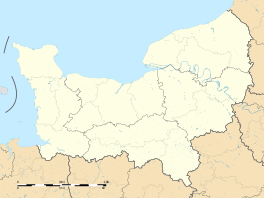Rouen, France
| Rouen | ||
|---|---|---|

Top: Downtown Rouen and the Seine River. Middle left: Maritime museum. Centre: The Great Clock. Middle right: Gustave-Flaubert Bridge. Bottom: Rouen Cathedral.
|
||
|
||
| Coordinates: 49°26′N 1°06′E / 49.44°N 1.10°ECoordinates: 49°26′N 1°06′E / 49.44°N 1.10°E | ||
| Country | France | |
| Region | Normandy | |
| Department | Seine-Maritime | |
| Arrondissement | Rouen | |
| Intercommunality | Métropole Rouen Normandie | |
| Government | ||
| • Mayor (2012–2014) | Yvon Robert (PS) | |
| Area1 | 21.38 km2 (8.25 sq mi) | |
| • Urban | 448 km2 (173 sq mi) | |
| • Metro (2010) | 1,800 km2 (700 sq mi) | |
| Population (2012)2 | 111,557 | |
| • Rank | 36th in France | |
| • Density | 5,200/km2 (14,000/sq mi) | |
| • Urban (2010) | 494,382 | |
| • Urban density | 1,100/km2 (2,900/sq mi) | |
| • Metro (2010) | 650,000 | |
| • Metro density | 360/km2 (940/sq mi) | |
| Time zone | CET (UTC +1) (UTC+1) | |
| • Summer (DST) | CEST (UTC+2) | |
| INSEE/Postal code | 76540 / | |
| Website | www.rouen.fr | |
|
1 French Land Register data, which excludes lakes, ponds, glaciers > 1 km² (0.386 sq mi or 247 acres) and river estuaries. 2Population without double counting: residents of multiple communes (e.g., students and military personnel) only counted once. |
||
1 French Land Register data, which excludes lakes, ponds, glaciers > 1 km² (0.386 sq mi or 247 acres) and river estuaries.
Rouen (French pronunciation: [ʁwɑ̃]; Frankish/Old High German: Rodomo; Latin: Rotomagus) is a city on the River Seine in the north of France. It is the capital of the region of Normandy. Formerly one of the largest and most prosperous cities of medieval Europe, Rouen was the seat of the Exchequer of Normandy during the Middle Ages. It was one of the capitals of the Anglo-Norman dynasties, which ruled both England and large parts of modern France from the 11th to the 15th centuries.
The population of the metropolitan area (in French: agglomération) at the 2007 census was 532,559, with the city proper having an estimated population of 110,276. People from Rouen are known as Rouennais.
Rouen and its metropolitan area of 70 suburban communes form the Agglomeration community of Rouen-Elbeuf-Austreberthe (CREA), with 494,382 inhabitants at the 2010 census. In descending order of population, the largest of these suburbs are Sotteville-lès-Rouen, Saint-Étienne-du-Rouvray, Le Grand-Quevilly, Le Petit-Quevilly, and Mont-Saint-Aignan, each with a population exceeding 20,000.
Rouen was founded by the Gaulish tribe of Veliocasses, who controlled a large area in the lower Seine valley, which today retains a trace of their name as the Vexin. The Gauls named the settlement Ratumacos and the Romans called it Rotomagus. Roman Rotomagus was the second city of Gallia Lugdunensis, after Lugdunum (Lyon). After the reorganization of the empire by Diocletian, Rouen became the chief city of the divided province of Gallia Lugdunensis II and reached the peak of its Roman development, with an amphitheatre and thermae, the foundations of which remain today. In the 5th century, it became the seat of a bishopric and later a capital of Merovingian Neustria.
...
Wikipedia



